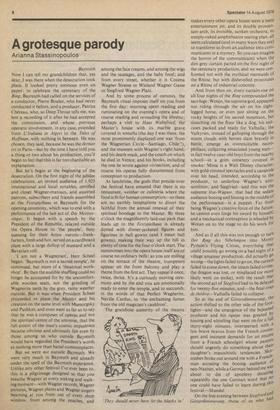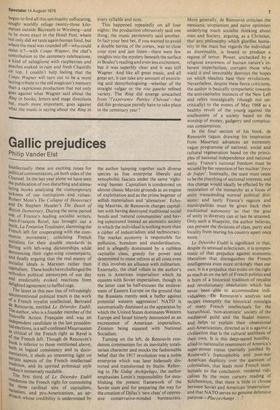A grotesque parody
Arianna Stassinopoulos
Bayreuth Now I can tell my grandchildren that, yes dear, I was there when the desecration took place. It looked pretty ominous even on paper: to celebrate the centenary of the Ring, Bayreuth had called on the services of a conductor, Pierre Boulez, who had never conducted it before, and a producer, Patrice Chereau, who, so Deep Throat tells me, was lent a recording of it after he had accepted the commission, and whose previous operatic involvement, in any case, extended from L'Italiana in Algeri to the Tales of Hoffman, with nothing in between. He was chosen, they said, because he was the dernier cri in Paris—but by the time I have told you a thing or two about his production, you'll begin to feel that this is far too charitable an explanation.
But let's begin at the beginning of the desecration. On the first night of the jubilee celebrations, an invited audience of 1,925 international and local notables, certified and closet Wagner-maniacs, and assorted patrons, subscribers and friends assembled at the Festspielhaus in Bayreuth for the opening ceremony, which was to end with a performance of the last act of Die Meistersinger. It began with a speech by the President of the Republic, relayed outside the Opera House to 'the people', busy queuing for their heisse wurstle—frankfurters, fresh and hot, served on a cardboard plate with a large dollop of mustard and a Etavarian roll.
'I am not a Wagnerian', Herr Scheel began. 'Bayreuth is not a sacred temple', he continued, but more of a 'theatrical workshop'. By then the audible shuffling could no longer be accounted for by the uncomfortable wooden seats, nor the grinding of Wagnerite teeth by the grey, rainy weather outside. liut it was when President Scheel proceeded to place the Meister and his creation on the same level with Mussorgsky and Pushkin, and even went as far as to say that he was a composer of operas and not the spiritual centre of the universe, that the full extent of the man's cosmic impudence became obvious and obviously felt even by those among us who outside Bayreuth would have regarded the President's words as nothing more than banal commonplaces.
But we were not outside Bayreuth. We were very much in Bayreuth and already under the spell of the Bayreuth experience. Unlike any other festival I've ever been to, this is a pilgrimage designed so that you breathe Wagner at every waking and walking moment—with Wagner records, Wagner pictures, Wagner plates and Wagner singers beaming at you from out of every shop window, from among the peaches, and among the face creams, and among the wigs and the sausages, and the baby food; and from every street, whether it is Cosima Wagner Strasse or Wieland Wagner Gasse or Siegfried Wagner Platz.
And by some process of osmosis, the Bayreuth ritual imposes itself on you from the first day: morning spent reading and ruminating on the evening's opera and of course reading and re-reading the libretto; perhaps a visit to Haus Wahnfried, the Master's house with its marble grave covered in wreaths (the day I was there, the most prominently displayed one was 'from the Wagnerian Circle—Santiago, Chile'!), and the museum with Wagner's right hand, and his death mask, and the couch on which he died in Venice, and his books, including the one he wrote against vivisection, and of course his operas fully documented from conception to production.
At lunchtime, the gods that preside over the festival have ensured that there is no restaurant, weinbar or cafeteria where the food is fit for human consumption—so there are no earthly temptations to divert the faithful from the annual renewal of their spiritual bondage to the Master. By three o'clock the magnificently laid-out park that leads up to the Festspielhaus is already dotted with dinner-jacketed figures and figurines in ball gowns (and I mean ball gowns), making their way up the hill in plenty of time for the four o'clock start. The summonses into the opera house itself are of course no ordinary bells: as you are milling on the terrace of the theatre, trumpeters appear on the front balcony and play a theme from the first act. They repeat it once, twice, thrice. It's a curiously moving ceremony and by the end you are emotionally ready to enter the temple, and to succumb, in the words of that Perfect Wagnerite, Neville Cardus, to 'the enchanting fumes from the old magician's cauldron'.
The grandiose austerity of the theatre
makes every other opera house seem a mere entertainment pit, and its double proscenium arch, its invisible, sunken orchestra, its steeply-raked amphitheatre seating plan, all seem calculated (and in many ways they are) to transform us from an audience into communicants in a mystery. So you can imagine the horror of the communicants when the dim grey curtain parted on the first night of the centenary production, and we were confronted not with the mythical mermaids of the Rhine, but with dishevelled prostitutes on a Rhine of industrial concrete.
And from then on, every curtain-rise on all four nights of the Ring compounded the sacrilege : Wotan, the supreme god, appeared not riding through the air on his eight legged horse, or even just sitting on the rocky heights of his sacred mountain, but slouching on the floor like a dog, his suitcases packed and ready for Valhalla; the Valkyries, instead of galloping through the storm clouds with heroes slain bravely in battle, emerge as overexcitable necrophiliacs, collecting emaciated young men in fact twelve-year-old boys from the nearbY school—in a grim cemetery covered in smoke: Mime is a Walt Disney character, with gold-rimmed spectacles and a casserole over his head, intended, according to the producer, to underline Wagner's antisemitism; and Siegfried—and this was the supreme leseWagner, that had the sedate audience booing and hissing in the middle of the performance—is a puppet. Far from being Wagner's creative force of the future, he cannot even forge his sword by himself, and a mechanical contraption is wheeled bY Wotan on to the stage to do his work for him.
And as if all this was not enough to turn Der Ring des Nibelungen into Mont)/ Python's Flying Circus, everything that could possibly go wrong on a bad night of a village amateur production, did actually go wrong—the lights failed to go on, the curtain failed to come down, the steam failed to rise, the dragon was lost, or misplaced (or more likely went on strike), with the result that the second act of Siegfried had to be delayed for twenty-five minutes, and—the final couP de theatre—Valhalla failed to collapse. So at the end of Gotterdamtnerung, the action shifted to the other side of the footlights—and the emergence of the bejeaned producer and his equipe was greeted hY hissing and whistling that went on for a full thirty-eight minutes, interspersed with a few brave bravos from the French contingent and insistent demands for an encore from a French schoolgirl whose parents should urgently do something about the daughter's masochistic tendencies. Skirmishes broke out around me with a French-, man accusing the booing audience ot neo-Nazism, while a German behind me was about to die of apoplexy shouting repeatedly the one German word that 11.° one could have failed to learn during this fest ival—Skandal. d nd On the free evening between Siegfriea A Gotterdantinerung, those of us who h1`.' begun to find all this spirituality suffocating, 'sought worldly refuge twenty-three kilometres outside Bayreuth in Wirsberg—and to be more exact in the Hotel Post, where not only did we taste again human food, but Where the meal was rounded off—who could resist it ?—with Coupe Wagner, the chef's contribution to the centenary celebrations, a kind of zabaglione with raspberries and Peaches soaked in rum and fresh Chantilly on top. I couldn't help feeling that the Coupe Wagner will turn out to be a more lasting tribute to the old magician's memory than a capricious production that not only goes against what Wagner said about the Ring in books, letters and stage directions but, much more important, goes against What the music is saying about the Ring in
every syllable and note.
This happened repeatedly on all four nights: the production obtrusively said one thing; the music persistently said another. In fact your best bet, if you wanted to avoid a double hernia of the cortex, was to close your eyes and just listen—there were few insights into the mystery beneath the surface in Boulez's reading and even less excitement, but it was superbly clear and it was still Wagner. And like all great music, and all great art, it can take any amount of exorcising and demythologising—whether of the straight vulgar or the rive gauche refined variety. The Ring did emerge unscathed from '/'experience Patrice Chereau'—but did this grotesque parody have to take place in the centenary year?



























 Previous page
Previous page